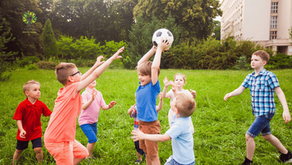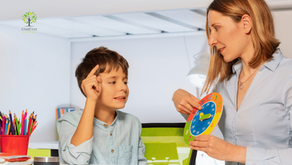Culinary Adventures: Cooking as a Therapeutic Activity for Autism
- ChildFirst Behavior Therapy
- Jan 28, 2024
- 5 min read

In a world where daily routines can sometimes be overwhelming, individuals with autism often find solace and joy in activities that provide a sense of order and creativity. One such therapeutic activity that has gained recognition for its positive impact is cooking. Beyond the delicious end results, the process of preparing meals can offer a myriad of benefits for individuals on the autism spectrum.
Understanding Autism and its Challenges
Before delving into the therapeutic aspects of cooking for individuals with autism, it's crucial to understand the challenges they may face. Autism, characterized by difficulties in social interaction, communication, and repetitive behaviors, often leads individuals to seek comfort in routine while struggling with changes in their environment.
The Enjoyable Experience of Cooking
Cooking engages multiple senses, making it an ideal activity for individuals with autism. From the touch and smell of various ingredients to the sound of sizzling pans, the experience of cooking can be soothing. Encouraging individuals to explore cooking in a controlled environment may foster a sense of familiarity and predictability, contributing to a more enjoyable culinary experience.
Developing Fine Motor Skills
For those with autism, developing fine motor skills can be a challenge. Chopping vegetables, stirring ingredients, and measuring quantities are activities that naturally enhance fine motor skills. The repetitive nature of these actions not only contributes to skill development but also promotes a sense of accomplishment, boosting self-esteem. As individuals master these skills, they gain confidence in their abilities, extending beyond the kitchen.
Enhancing Social Skills through Teamwork
Cooking often involves collaboration, turning it into a social activity that encourages teamwork. Whether preparing a family dinner or participating in a cooking class, individuals with autism can practice communication, cooperation, and turn-taking. These social interactions contribute to improved interpersonal skills and a greater sense of community. Through shared culinary experiences, individuals learn the importance of working together, fostering meaningful connections.
Creating a Predictable Routine

Establishing a routine is crucial for many individuals with autism, providing a sense of order and security. Cooking allows for the creation of a predictable routine – from planning the menu to cleaning up afterward. This structured process can be a source of comfort and stability, helping individuals navigate their daily lives with greater ease. The routine created through cooking becomes a cornerstone, promoting a sense of security and control.
Exploring Diverse Flavors and Textures
Introducing a variety of ingredients during cooking exposes individuals to diverse flavors and textures. This not only expands their culinary palate but also encourages them to explore new experiences. Experimenting with different tastes becomes an exciting adventure, fostering a sense of curiosity and openness to new possibilities. The exploration of diverse flavors transcends the kitchen, influencing individuals' openness to new experiences in various aspects of their lives.
Incorporating Educational Elements
Cooking serves as a practical and enjoyable way to incorporate educational elements into daily activities. Measuring ingredients involves basic math skills, while following recipes enhances reading comprehension. For individuals with autism, this hands-on approach to learning can be more engaging and effective than traditional methods. The integration of education into cooking transforms the activity into a holistic learning experience, enhancing cognitive abilities and promoting a positive attitude towards learning.
Encouraging Independence and Confidence
As individuals with autism master cooking skills, they gain a sense of independence and confidence. The ability to prepare meals for themselves or others instills a feeling of accomplishment, contributing to overall well-being. This newfound confidence often extends beyond the kitchen, positively impacting various aspects of their lives. Through cooking, individuals not only develop practical life skills but also cultivate a sense of self-reliance, empowering them in their daily endeavors.
Tailoring Cooking Activities to Individual Needs
It's important to note that each individual with autism is unique, and their preferences vary. When incorporating cooking as a therapeutic activity, it's crucial to tailor the experience to their specific needs. This personalized approach ensures that the activity remains enjoyable and beneficial for each individual. Understanding and respecting individual preferences create a supportive environment, where individuals can fully engage in the therapeutic benefits of cooking.
Overcoming Challenges and Celebrating Progress
While cooking can be highly beneficial for individuals with autism, it's essential to acknowledge and overcome potential challenges. Patience, flexibility, and positive reinforcement play key roles in creating a supportive environment. Celebrating even small achievements in the kitchen can significantly boost confidence and motivation. The journey of overcoming challenges becomes an integral part of the therapeutic process, promoting resilience and a positive mindset.
Cooking as a Lifelong Journey

As we explore the profound impact of cooking on individuals with autism, it becomes clear that this therapeutic activity is not just a temporary fix but a lifelong journey. The joy, skills, and social interactions gained through cooking continue to evolve, contributing to personal growth and well-being over time. Embracing cooking as an integral part of the daily routine for individuals with autism opens doors to a world of possibilities, nurturing their potential and enriching their lives.
Conclusion
Culinary adventures provide a unique and valuable avenue for individuals with autism to thrive. From the enjoyable experience of cooking to the development of essential skills, this therapeutic activity offers a holistic approach to addressing the unique needs of individuals on the autism spectrum. By recognizing and embracing the potential of cooking, we pave the way for a fulfilling and enriching journey for kids with autism, supporting their well-being and fostering a positive outlook on life.
FAQ’s
Why is cooking considered a therapeutic activity for individuals with autism?
Cooking engages multiple senses, providing a great experience. It may foster a sense of familiarity and predictability, making it an ideal therapeutic activity for individuals with autism.
How does cooking contribute to the development of fine motor skills?
Chopping vegetables, stirring ingredients, and measuring quantities during cooking naturally enhance fine motor skills. The repetitive nature of these actions promotes skill development and boosts self-esteem in individuals with autism.
Can cooking help individuals with autism improve their social skills?
Yes, cooking often involves collaboration and teamwork. Whether preparing a family dinner or participating in a cooking class, individuals with autism can practice communication, cooperation, and turn-taking, contributing to improved social skills.
In what ways does cooking create a predictable routine for individuals with autism?
Cooking allows the creation of a structured routine, from planning the menu to cleaning up afterward. This routine becomes a source of comfort and stability, helping individuals with autism navigate their daily lives with greater ease.
How does cooking encourage the exploration of diverse flavors and textures?
Introducing a variety of ingredients during cooking exposes individuals to diverse flavors and textures. This not only expands their culinary palate but also encourages them to foster curiosity and openness.
How can cooking be tailored to meet the individual needs of those with autism?
It's crucial to recognize that each individual with autism is unique. When incorporating cooking as a therapeutic activity, it's important to tailor the experience to their specific preferences, creating a supportive and enjoyable environment.
What role does cooking play in encouraging independence and confidence in individuals with autism?
As individuals with autism master cooking skills, they gain a sense of independence and confidence. The ability to prepare meals for themselves or others instills a feeling of accomplishment, positively impacting various aspects of their lives beyond the kitchen.




Comments